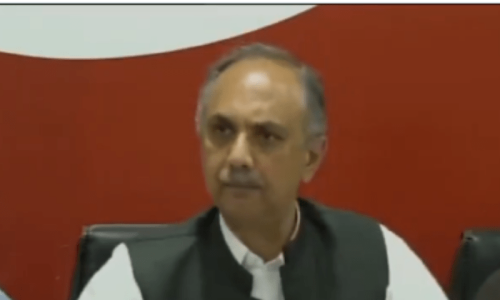IN Husain Haqqani’s recent column in Dawn, the former ambassador to the US outlined how Pakistan’s foreign policy paradigm is now outdated, given the recent American tilt towards India.
“Instead of breeding competition with India in the national psyche, we must focus on addressing institutional weaknesses, eliminating terrorism, improving infrastructure, and modernising the economy.” His succinct phrasing crystallised an opinion I have been formulating for some time: that Pakistan’s foreign policy doesn’t work because our national psyche is based on pure machismo.
Machismo is defined as “strong or aggressive masculine pride” — and it’s this masculine pride that characterises us as a nation, with heavy dependency on an almost all-male army, a male-dominated political scene, sophisticated weaponry, and a large national ego that overreacts to the slightest threat. Yet if we made efforts to adopt feminist principles into our national psyche, I believe it would positively affect the narratives and discourse that so desperately need changing today.
Historically, machismo’s underlying values were of responsibility and respect. Strong community leadership and defending family and family honour were a source of pride to men, according to psychologist G.M. Arciniega, who has researched the concept of machismo in Latin American cultures. But today’s macho man takes on different, negative qualities: hypersexuality, punitive attitudes towards women, social domination, narcissism, to name a few. Does this sound familiar when we think of Pakistan’s national psyche, and how we conduct our day-to-day lives in this country?
Feminist principles must be part of our national psyche.
Certainly, our foreign policy is imbued with machismo, with its need to ‘rattle sabres’ and prove to the world that we will react aggressively when threatened, by deploying nuclear weapons if need be. We take it as a matter of national pride to defend our borders and protect our interests, and we show an intensely competitive bent in promoting those national interests, using India as a yardstick for our own successes and failures (if we dare to admit we have any).
And yet, like the macho man, there is a surprising insecurity that lies underneath Pakistan’s aggressive stance.
But as Henry Kissinger wrote in 1969, “Foreign policy begins where domestic policy ends.” Bearing this in mind, we should transform our international machismo into a different way of conducting ourselves, both at home and abroad. We should instead be inspired by the universal struggle of women to achieve social, economic, and political parity, and apply its guiding principles to redesigning our national character.
I don’t refer to the traditional, and very Pakistani, understanding of feminism as an effort to empower women to the detriment of men. True feminism goes deeper than gender equality, and addresses issues of power structure, equal participation in nation-building, distribution of resources, and human rights. These are issues we must address in our national narrative, our social order, and our identity-formation as Pakistanis to progress.
Pakistan’s raison d’être cannot revolve around the macho man’s dreams of competing with India or dominating any regional geopolitical area for eternity. Instead, it must concentrate on proving itself a livable nation in which all its citizens are free to pursue their goals and achieve their full potential. To this end, Pakistan must commit to the feminist principle of equality for all men and women, instead of the patriarchal tendency to concentrate power, jobs, resources and access in the hands of a few — mostly rich — men.
Pakistan must also rewrite its social contract, which at the moment serves to only cement the existing hierarchies of our tribal underpinnings, which are also decidedly male-dominated. By revisiting what it means to have come together as Pakistanis to live under one flag, and by rejecting the idea that the nation’s populace exists to serve its political figures, we can start to undo some of the damage that our existing dysfunctional social contract has done to the nation.
But until we as a nation redefine the legal, political and social benefits that our nation has pledged to deliver to its people, we will never get a clear picture of why this nation was created in the first place. Those benefits must include equal access for all men and women to the corridors of power, to diplomacy, lawmaking and policymaking — again, instead of those opportunities being concentrated amongst the chosen few. If we can make the national discourse truly pluralistic, by being inclusive of all members of society — the goal of feminism — we will permanently change for the better the dynamic of our current, limited existence.
Finally, with an internal shift away from machismo and towards feminist — and ultimately humanist — principles, our foreign policy might veer away from competition, warmongering and mutually assured destruction. We would then find the space to internationally project our commitment to equality, opportunity, and ultimately, human rights. And this is the tilt that would truly win us friends and admirers around the world.
The writer is the author of A Season For Martyrs.
Published in Dawn, February 10th, 2015
On a mobile phone? Get the Dawn Mobile App: Apple Store | Google Play













































